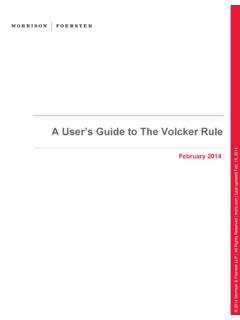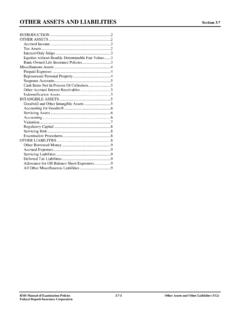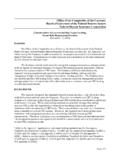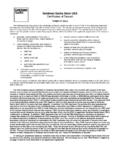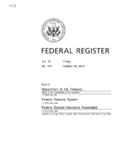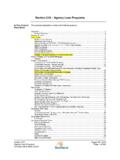Transcription of Frequently Asked Questions about Section 3(a)(2) …
1 F R E Q U E N T L Y A S K E D Q U ES T I O N S A B O U T S E C T I O N 3 (a)( 2 ) B A N K N O T E P R O G R A M S Understanding Section 3(a)(2) Bank Note Programs What is a Section 3(a)(2) bank note program? A Section 3(a)(2) bank note program is a medium-term note ( MTN ) program that enables an issuing bank to offer debt securities on a regular and/or continuous basis. The issuer (or a guarantor of the notes) must be a bank, as defined in Section 3(a)(2) of the Securities Act of 1933 (the Securities Act ). Bank note programs are exempt from registration under the Securities Act. What is Section 3(a)(2)? Section 3(a)(2) exempts any security issued or guaranteed by a bank from registration under the Securities Act. This exemption is based on the principle that, whether chartered under state or federal law, banks are highly and relatively uniformly regulated, and as a result will typically provide adequate disclosure about their business and operations, even in the absence of federal securities registration requirements.
2 In addition, banks are also subject to various capital requirements that may help increase the likelihood that holders of their debt securities will receive timely principal and interest payments. What is a bank ? Section 3(a)(2) broadly defines a bank to mean any national bank, or any banking institution organized under the law of any State, territory, or the District of Columbia, the business of which is substantially confined to banking and is supervised by the State or territorial banking commission or similar official. To qualify as a bank under Section 3(a)(2), the institution must meet two requirements: (i) it must be a national bank or any institution supervised by a state banking commission or similar authority; and (ii) its business must be substantially confined to banking.
3 Therefore, securities issued by bank holding companies, finance companies, investment banks and loan companies are not exempt from registration under Section 3(a)(2). Even though many investors may think of them as banks, their businesses are not substantially confined to banking. A securities offering by any of these institutions must be registered under the Securities Act unless the offering falls under another exemption from registration. Is a bank eligible for a Section 3(a)(2) bank note program? No; however, for purposes of the exemption from registration provided by Section 3(a)(2), the Securities and Exchange Commission (the SEC ) deems a branch 2 or agency of a foreign bank located in the United States to be a national bank, or a banking institution organized under the laws of any State, Territory, or the District of Columbia, provided that the nature and extent of federal and/or state regulation and supervision of the particular branch or agency is substantially equivalent to that applicable to federal or state chartered domestic banks doing business in the same jurisdiction.
4 The determination with respect to the requirement of substantially equivalent regulation, as well as the determination as to whether the business of the branch or agency in question is substantially confined to banking and is supervised by the State or territorial banking commission or similar official is the responsibility of issuers and their counsel. These determinations are made with regard to the banking regulations in effect at the time the securities are issued or guaranteed. Source: Securities Issued or Guaranteed by United States Branches or Agencies of Foreign Banks, SEC Release No. 33-6661 SEC Docket (1973-2004), 36 SEC-DOCKET 746-1 (September 23, 1986). Can the issuer be a finance company, if the securities are guaranteed by a bank? Yes. As noted above, the Section 3(a)(2) exemption is also available for securities guaranteed by a bank.
5 Whether an offering is guaranteed by a bank is interpreted broadly by the SEC. The staff of the SEC has taken the position in no-action letters that the term guarantee is not limited to a guaranty in a legal sense, but also includes arrangements in which the bank agrees to ensure the payment of a security. However, in a typical guaranteed offering, a bank s affiliate will serve as issuer of the relevant securities, and the entity that is a bank will execute a written guarantee of the payment obligations on those securities. Guarantees by a foreign bank (other than those by an eligible branch or agency) would not qualify for the Section 3(a)(2) exemption. What are the differences between a Section 3(a)(2) bank note program and a registered MTN program? There are more similarities than differences between the two programs.
6 For a description of a registered MTN program, please see Frequently Asked Questions about Medium-Term Note Programs, which can be found at Relevant differences between the two programs will be discussed in this FAQ. What types of securities normally are sold through a Section 3(a)(2) bank note program? A wide variety of securities can be offered through a Section 3(a)(2) bank note program. Bank notes can be senior or subordinated, fixed or floating rate, zero-coupon, dollar denominated, amortizing, multi-currency or indexed (structured) securities. Common reference rates for floating rate bank notes include LIBOR, EURIBOR, the prime rate, the Treasury rate, the federal funds rate and the CMS rate. Most bank note programs are rated investment-grade by one or more nationally recognized rating agencies.
7 3 Regulations Governing Offerings Under Bank Note Programs Which or state regulations govern offerings under a Section 3(a)(2) bank note program? The Office of the Comptroller of the Currency (OCC) regulates disclosure in connection with offers and sales of securities by national banks and federally licensed branches and agencies of foreign banks (but not state banks). 12 Part 16, the OCC s Securities Offering Disclosure Rules (the OCC Regulations ), provides that these banks may not offer and sell their securities until a registration statement has been filed and declared effective with the OCC, unless an exemption applies. Issuers are required to follow the form requirements of the form that they would use to register securities under the Securities Act if they were not exempt from such registration.
8 The OCC Regulations provide an exemption from the registration requirements if the securities would be exempt from registration under the Securities Act other than by reason of Sections 3(a)(2) or 3(a)(11), or the securities are offered in transactions that satisfy certain exemptions under the Securities Act, including the following: Regulation D offerings; Rule 144A offerings to qualified institutional buyers; and Regulation S offerings effected outside of the United States. Rule 144A and Rule 506 of Regulation D now allow general solicitation or general advertising of offers, provided that the securities are sold only to accredited investors (in the case of Rule 506 offerings) or QIBs (in the case of Rule 144A offerings). In a Rule 506 offering, the issuer must take reasonable steps to verify that the purchasers are accredited investors.
9 The disqualification provisions of Rule 506 prohibit the use of the exemption by certain bad actors and felons. The disqualification events apply to the issuer, persons related to the issuer and anyone who will be paid (directly or indirectly) remuneration in connection with the offering (placement agents and others). The OCC Regulations also contain an exemption for offers and sales of nonconvertible debt securities if a number of conditions are met under Part , including: the issuer or its parent bank holding company has a class of securities registered under 15(d) of the Securities Exchange Act of 1934 (the Exchange Act ), or, in the case of issuances by a federal branch or agency of a foreign bank, such federal branch or agency provides the Comptroller the information specified in Rule 12g3-2(b) under the Exchange Act and provides investors with the information specified in Rule 144A(d)(4)(i) under the Securities Act; all offers and sales are to accredited investors, as defined in Rule 501 under the Securities Act.
10 The securities are investment grade, as discussed below; the securities are sold in a minimum denomination of $250,000 and are legended to provide that they cannot be exchanged for securities in smaller denominations; prior to or simultaneously with the sale of the securities, the purchaser receives an offering 4 document that contains a description of the terms of the securities, the use of proceeds and the method of distribution, and incorporates certain financial reports or reports filed under the Exchange Act; and the offering document and any amendments are filed with the OCC no later than the fifth business day after they are first used. The current definition of investment grade, which came into effect on January 1, 2013, does not require a specific rating for the relevant bank notes.




